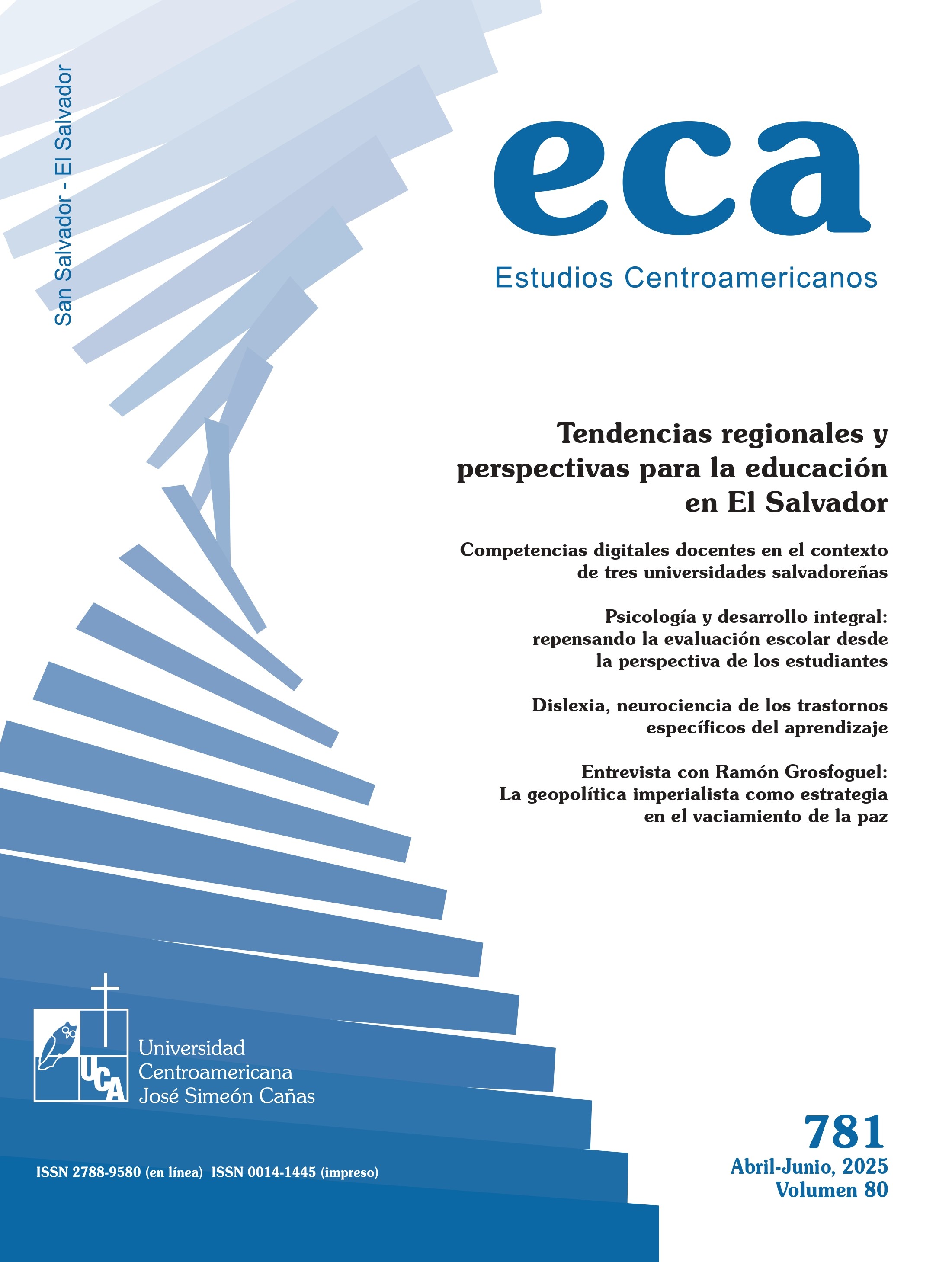Abstract
The advancement of digital technologies has transformed the educational landscape, requiring educators to develop digital competencies for effective teaching in virtual environments. In El Salvador, the COVID-19 pandemic accelerated the transition to online education, highlighting the need to strengthen the technological skills of university instructors. In this regard, this study aimed to analyze the current digital competencies of higher education instructors at three Salvadoran universities. A qualitative methodology with a cross-sectional design and explanatory approach was adopted. Twenty-four virtual classrooms were reviewed using a 15-item observation guide, and three in-depth interviews were conducted with virtual education directors at the universities studied. Data analysis included open and axial coding, complemented by content analysis of institutional documents. The results reveal that university instructors at the three universities studied have demonstrated significant progress in digital literacy, primarily in the creation and updating of virtual classrooms. However, the limited use of multimedia reindicates as videos and simulations, indicates that digital skills have not yet been fully developed, especially in terms of creating interactive content.
References
Ander-Egg, E. (1995). Técnicas de investigación social. Editorial Lumen. https://epiprimero.wordpress.com/wp-content/uploads/2012/01/ander-egg-tecnicas-de-investigacion-social.pdf
Banoy-Suarez, W. y Montoya-Marín, E. A. (2022). Desarrollo de competencias digitales en docentes de educación básica y media. Revista Tecnología Educativa Docentes 2.0, 15(1), 59-74. http://ve.scielo.org/scielo.php?script=sci_arttext&pid=S2665-02662022000300059
Barbazan Capéans, D., Ben Abdellah, K. D. M. y Montes Hoyos, C. M. (2021). La competencia digital docente en educación superior: estado del arte en España y Latinoamérica. Étic@Net, Revista de Educación y Comunicación en la Sociedad del Conocimiento, 21(2), 267-282. https://revistaseug.ugr.es/index.php/eticanet/article/view/20837
Bates, A. W. (2019). Teaching in a Digital Age: Guidelines for Designing Teaching and Learning (2.a ed.). Tony Bates Associates Ltd. https://pressbooks.bccampus.ca/teachinginadigitalagev2/
Echeverría Mayorga, C. A., Escalante de Guardado, K. A. y Onofre Mendoza, N. O. (2023). Alfabetización tecnológica del docente universitario en El Salvador. Revista De Investigación, 2(14), 10-29 https://camjol.info/index.php/revunivo/article/view/17012
European Commission. (s. f). Digital Competence Framework for Citizens (DigComp). European Commission. https://joint-research-centre.ec.europa.eu/projects-and-activities/education-and-training/digital-transformation-education/digital-competence-framework-citizens-digcomp_en
Hernández Sampieri, R. H., Fernández Collado, C. y Baptista Lucio, P. (2014). Metodología de la investigación (6.a ed). McGraw-Hill. https://www.esup.edu.pe/wp-content/uploads/2020/12/2.%20Hernandez,%20Fernandez%20y%20Baptista-metodolog%C3%ADa%20Investigacion%20Cientifica%206ta%20ed.pdf
Koehler, M. J. y Mishra, P. y (2008). Introducing Technological Pedagogical Content Knowledge. En AACTE Committee on Innovation and Technology (Eds.), Handbook of Technological Pedagogical Content Knowledge (TPCK) for Educators (pp. 3-29). Routledge. https://punyamishra.com/wp-content/uploads/2008/05/koehler_mishra_08.pdf
Menjívar Valencia, E. y Pérez Rodríguez, C. L. (2009). Las competencias digitales de los docentes de la Universidad Don Bosco. Roca. Revista científico - Educacional De La Provincia Granma, 19(3), 83-105. https://rd.udb.edu.sv/server/api/core/bitstreams/5e5caaa5-b527-41f3-b693-ab609166f89f/content
Organización de las Naciones Unidas para la Educación, la Ciencia y la Cultura. (2011). UNESCO ICT Competency Framework for Teachers. UNESCO. https://unesdoc.unesco.org/ark:/48223/pf0000213475
Redecker, C. (2017). European Framework for the Digital Competence of Educators: DigCompEdu. Publications Office of the European Union. https://publications.jrc.ec.europa.eu/repository/handle/JRC107466
Rojas Soriano, R. (2013). Guía para realizar investigaciones sociales. Plaza y Valdés Editores. https://raulrojassoriano.com/cuallitlanezi/wp-content/themes/raulrojassoriano/assets/libros/guia-realizar-investigaciones-sociales-rojas-soriano.pdf
Strauss, A. y Corbin, J. M. (1990). Basics of qualitative research: Grounded theory procedures and techniques. Sage Publications, Inc. https://psycnet.apa.org/record/1990-98829-000
Vásquez Peñafiel, M.-S., Núñez, P. y Cuestas Casas, J. (2023). Competencias digitales docentes en el contexto de COVID-19. Un enfoque cuantitativo. PIXEL-BIT. Revista de Medios y Educación, 67, 155-185. https://recyt.fecyt.es/index.php/pixel/article/view/98129
Villota García, S. C., Zamora López, G. G. y Llanga Vargas, E. F. (2019). Uso del internet como base para el aprendizaje. Revista Atlante. Cuadernos de Educación y Desarrollo. https://www.eumed.net/rev/atlante/2019/05/internet-aprendizaje.html

This work is licensed under a Creative Commons Attribution-NonCommercial-NoDerivatives 4.0 International License.
Copyright (c) 2025 David Alberto Quintana Pérez, Armando Briñis Zambrano, Pedro Joaquín Torres Serrano






